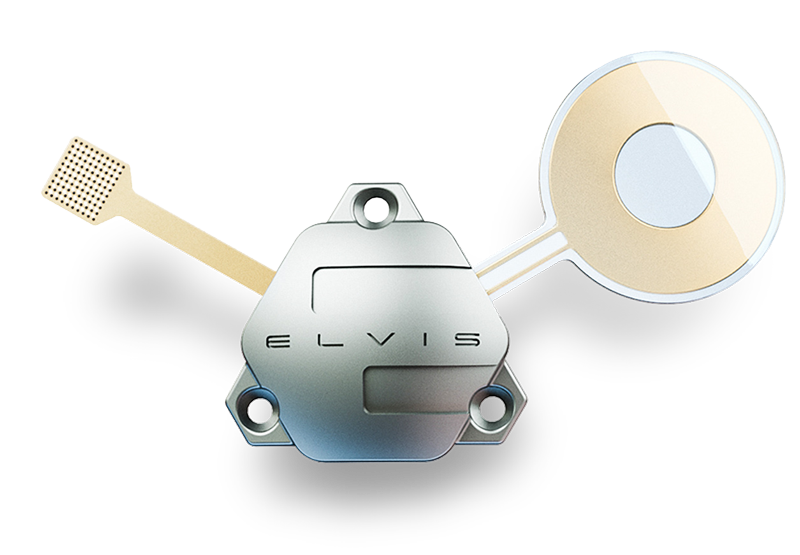

Unique Technology
that Can Help
Blind People to See
Supported by the Deaf-Blind
Support Foundation ''Con-nection''
Support Foundation ''Con-nection''

Brain Implant
to Restore Vision
to Restore Vision
i
The ELVIS project is included in the top 100 leaders in the development of the social sphere of the Agency for Strategic Initiatives and is a resident of the Skolkovo Foundation
How it Works



A person sees with no eyes but the brain.
Thus, the retina and the optic nerve can be replaced by a camera.
Thus, the retina and the optic nerve can be replaced by a camera.
Object vision is formed in the occipital lobe of the brain called the visual cortex.

The ELVIS V microchip stimulates the primary visual cortex with small currents, due to which a person sees bright flashes - phosphenes that form visual sensations.

The ELVIS V microcomputer processes the picture with the help of neural networks and provides hints to the user.

How ELVIS V looks like
ELVIS V comprises three components


Cameras capture the surrounding image
Band with camera
A wireless transmitter transmits stimulation commands to the chip on the patient's head
Processing unit
Processing unit with control buttons mounted on a belt
Is placed on a person's head.
Wireless sensor transmits stimulation commands to the chip on the patient's head. The device is hung on a belt and connected to the band with a wire.
Gets installed in the human brain and stimulates visual cortex by low currents.
Brain implant with microchip
Microchip in direct contact with the cerebral cortex

The antenna is placed on the band. Receives the signal from the transmitter placed on the band
What does a person with ELVIS V see?
1.
Such image gets caught by ELVIS V cameras
2.
A special AI-algorithm marks out the shape of objects
3.
As a result, such image is formed in the mind of a blind person
Stages of the ELVIS V project development
2021-2022
Developing the chip and electrodes
Developing the chip and electrodes
We developed our own chip and electrodes as well as the production technology in Russia. Carryed out trials on animals – rats and apes.
On the basis of trials, we've chosen the most efficient technology and finished developing the whole system.
On the basis of trials, we've chosen the most efficient technology and finished developing the whole system.
2024-2026
Human trails
Human trails
At this stage, we are planning to manufacture first sample batches of ELVIS V in order to perform human trials, no more than 10 people. Blind and deaf-blind volunteers will be able to obtain a new means of vision and become first users of a full-fledged bionic brain implant in Russia.
Performing these trials will be taking place within the framework of registration of a new type of medical device in the Russian Federation.
Performing these trials will be taking place within the framework of registration of a new type of medical device in the Russian Federation.
2027 г.
First surgeries
First surgeries
This year could become a cut-off point for introducing ELVIS V into the Russian medical practice.
We are planning to perform first surgeries with the support of the Russian Ministry of Health as well as on commercial basis for wealthy clients and with support from charity foundations and sponsors.
We are planning to perform first surgeries with the support of the Russian Ministry of Health as well as on commercial basis for wealthy clients and with support from charity foundations and sponsors.
2021-2022
Developing the chip and electrodes
Developing the chip and electrodes
We developed our own chip and electrodes as well as the production technology in Russia. Carryed out trials on animals – rats and apes.
On the basis of trials, we've chosen the most efficient technology and finished developing the whole system.
On the basis of trials, we've chosen the most efficient technology and finished developing the whole system.
2024-2026
Human trails
Human trails
At this stage, we are planning to manufacture first sample batches of ELVIS V in order to perform human trials, no more than 10 people. Blind and deaf-blind volunteers will be able to obtain a new means of vision and become first users of a full-fledged bionic brain implant in Russia.
Performing these trials will be taking place within the framework of registration of a new type of medical device in the Russian Federation.
Performing these trials will be taking place within the framework of registration of a new type of medical device in the Russian Federation.
2027
First surgeries
First surgeries
This year could become a cut-off point for introducing ELVIS V into the Russian medical practice.
We are planning to perform first surgeries with the support of the Russian Ministry of Health as well as on commercial basis for wealthy clients and with support from charity foundations and sponsors.
We are planning to perform first surgeries with the support of the Russian Ministry of Health as well as on commercial basis for wealthy clients and with support from charity foundations and sponsors.
Unique development
ELVIS V could become the first mass product in Russia with electrodes implanted into the brain on long term.
The key technology of the project is to develop our own array of electrodes and a special microchip for operating these electrodes. To develop the project and for safety of our users it is important that the production technology be based entirely in Russia.
The key technology of the project is to develop our own array of electrodes and a special microchip for operating these electrodes. To develop the project and for safety of our users it is important that the production technology be based entirely in Russia.
Our team
Laboratory "Sensor-Tech" is the project leader. Our team comprises 23 specialists – talented engineers, scientists in the field of neurophysiology, ophthalmology and experts in the area of rehabilitation of blind people.
- Denis KuleshovProject lead, expert in the field of technologies for disabled people with sensory impairments
- Alexander SigovAcademician of the Russian Academy of Sciences, Doctor of Physical and Mathematical Sciences, Professor, leading scientist in the field of nano and microelectronics
- Pavel BalabanCorresponding member of the Russian Academy of Sciences, Doctor of Biological Science, Professor, leading Russian biologist and neurophysiologist
- Alexander PopovHead of the technical team of developers, specialist in the field of microelectronics and AI
- Andrey DemchinskyHead of medical team of developers, ophthalmologist, leading expert in bioengineering systems to restore vision
- Elisaveta Kuleshova
Head of PR and Analytics Department
Expert in the field of analytics and project promotion
Partners
Want to take part in a clinical trial?

Tell your story and be part of the project!
By clicking on the button, you consent to the processing of personal data and agree to the privacy policy























